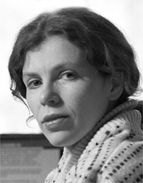 Yulia Latynina
Yulia LatyninaIt is a commonly held belief that Aug. 21, 1991 and Oct. 4, 1993 — the dates on which the State Committee of the State of Emergency collapsed and former President Boris Yeltsin emerged victorious from his tank attack on the parliament building — were decisive days in Russia's modern history.
The argument is that on those dates, conflicts came to a climax, the old order fell and life in Russia entered a new stage.
Of course, I understand that from the point of view of the participants, those events resolved the most important question: who would sit in jail and who would sit in the Kremlin. But from the perspective of Russian history, neither the fall of the State Committee nor the October coup were pivotal events. This is true for the simple reason that an avatar of former Vice President Alexander Rutskoi, who did not manage to take power in 1993, later came to power in 1999 has continued to rule Russia for the past 14 years in the form of President Vladimir Putin.
The problems in the 90s were fuled by the fact that, oil prices fell to just $12 per barrel. Under Putin it has surpassed $100 per barrel. As a result, many Russians associate democrats and liberals with hardship and Putin's power vertical with timely payments of salaries and pensions.
If Rutskoi had come to power, Russia would have experienced the very same privatization and inflation that was seen under Yeltsin. True, freedoms would have been more restricted under Rutskoi, but nobody would have referred to the unfolding events as "democracy" and "liberalism" and those concepts would not have been so thoroughly discredited in the eyes of ordinary Russians.
August 1991 and October 1993 would have been momentous months if Yeltsin had implemented truly radical reforms, turning the great mass of voters into prosperous, middle class citizens and thereby shutting off all avenues for Putin to come to power.
The tragedy is that it was because of democracy that Yeltsin could not carry out those reforms.
Every influential group of any significance in post-Soviet Russia absolutely hated the free market. One of the largest such groups consisted of workers of uncompetitive industries and collective farms. They could have cared less as to why their firms were uncompetitive; they cared only about receiving regular salaries and social benefits. Another group was the communists, KGB staffers and so-called "red directors" of state-owned firms. This group was not so large, but it was very influential. It was determined to maintain its administrative status or to somehow convert that power into financial gain.
As a democratic president, Yeltsin had to curry favor with both groups. But it was for the sake of the second that he began printing money, drove up inflation and introduced the status of "special exporters." It was the second group that cashed in on its status, later blaming all of the country's problems, that they had themselves provoked, on the democrats. That was not entirely unjustified, as the president was ultimately responsible for the economic situation, not those whom he had to cajole and appease.
The problem is not how to properly evaluate Rutskoi's actions. The problems are that Rutskoi was just as aggressive and as die-hard communist during the next parliamentary elections; Communist Party leader Gennady Zyuganov would have won the elections in 1996 if a massive campaign had not been waged to brainwash voters against him; and that by 1999, the only two possible candidates for president were Yury Luzhkov and Putin — meaning that elections in Russia had already lost any strategic meaning. What would the difference be, anyway? Only that in place of Igor Sechin we would have Luzhkov's wife, Yelena Baturina.
Yulia Latynina hosts a political talk show on Ekho Moskvy radio.
A Message from The Moscow Times:
Dear readers,
We are facing unprecedented challenges. Russia's Prosecutor General's Office has designated The Moscow Times as an "undesirable" organization, criminalizing our work and putting our staff at risk of prosecution. This follows our earlier unjust labeling as a "foreign agent."
These actions are direct attempts to silence independent journalism in Russia. The authorities claim our work "discredits the decisions of the Russian leadership." We see things differently: we strive to provide accurate, unbiased reporting on Russia.
We, the journalists of The Moscow Times, refuse to be silenced. But to continue our work, we need your help.
Your support, no matter how small, makes a world of difference. If you can, please support us monthly starting from just $2. It's quick to set up, and every contribution makes a significant impact.
By supporting The Moscow Times, you're defending open, independent journalism in the face of repression. Thank you for standing with us.
Remind me later.







